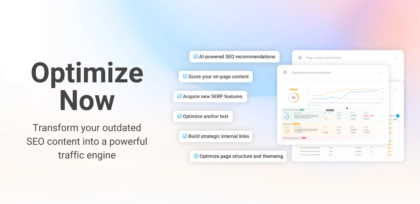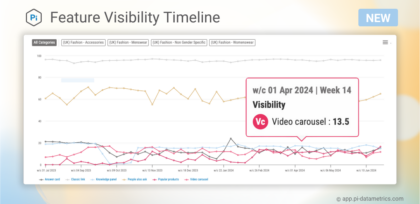Podcast | Moral marketing with search and social data
14 Mar 2019|4 MIN READ
Moral marketing with search and social data
In this month’s episode we’re discussing the rise of legislative brands, and how they can use search intelligence and social insights to inform their conscious campaigns. We're also joined by Gemma Joyce from Brandwatch sharing her expertise on social data.
We explore:
- What is a legislative brand?
- Why brands are becoming more socially responsible
- The importance of tracking your campaign
- Using search and social in tandem to research, execute and review your campaign
Read more about integrated data here.
Now available on Apple podcasts and Spotify.
AI Transcription
This podcast has been transcribed using an AI transcriber. There may be some errors and this is not a substitute for listening to the episode.
Emily Hogarth 0:04
Hi, welcome to Elevate search podcast from Pi Datametrics with me Emily Hogarth
Louise Linehan 0:09
and me, Louise Linehan
EH 0:11
where we'll be discussing the hot topics across search alongside some of the industry's best thought leaders.
LL
In this month's episode, we're discussing the rise of legislative brands, and how they can use search intelligence and social insights to inform their conscious campaigns. And we'll also be joined by Gemma Joyce from Brandwatch sharing her expertise on social data.
LL 0:34
So what do we mean when we say legislative brands,
EH 0:37
when brands and or businesses use their platform to call for or promote an even impose laws that drive constructive change and make the world a better place
LL 0:48
Recently, we see not doing this with its Colin Kaepernick campaign. And Gillette's, the best a man can be ad. So people's priorities have changed. And we now want the companies we invest in or associate with to stand for something.
EH 1:00
So why are brands moving to be more socially responsible?
LL 1:04
I think it's really down to the proliferation of modern media, and specifically social media is not just a one sided debate anymore, it's become like a discussion forum. So more information is being shared, consumers are becoming more and more informed on moral matters. And online communities are growing. Also, influences are highlighting social and ethical issues. So it's definitely more in the forefront of people's minds,
EH 1:27
you can illustrate how important new media is by looking at the ice and Christmas ad. So that was banned from TV, which is sort of the more traditional way to reach your audience. But as it was banned, they posted it online anyway. And it was the most popular Christmas ad. So you can just see how important it was to reaching that audience. And it didn't matter. They weren't using traditional media. So you need to have an understanding of your online audience and monitor the growth topics that they feel passionately about.
LL
And it proves that if you do address those topics that feed into consumers identities, or be it in the right way, you can become a brand that they gravitate towards
EH 2:09
Yeah, exactly.
LL 2:11
So why is it important for brands to track reaction to these sorts of campaigns?
EH 2:16
While you don't know how your campaign is going to pan out, you're dealing with pretty contentious topics. So you don't know if you've hit the nail on the head. Have you got the tone, right? And the only way is to track reaction in real time to understand you know, if you've done the right thing, it's so important to know how your campaign is panning out.
LL 2:36
Yeah, I'm you need to think about also pre campaign what what can go wrong. When you're taking a strong stance on such a sensitive issue, you need to weigh up the benefits and disadvantages. And you don't want to ostracize any audiences, especially as with the advent of modern media, audiences are so much more diverse. They've got differing differing wants, needs and opinions. So how do you find out all of that information and inform your campaign? And that is with data basically.
EH 3:06
So if we were Gillette, using search intelligence, how would we use that data to inform our conscious campaign for the best a man can be?
LL 3:17
so there's three different ways you can use search data, I think that's like the great thing about it. You can use it before, during and after your campaign. So for example, if I worked in the marketing marketing department at Gillette, pre campaign, I might have asked myself a question, how can I align myself with topics my customers care about? So I might make a hypothesis on the topics, I think, gaining traction with my customers, and then I can turn to search to either prove or disprove this. So for example, I might aggregate multiple searches around my moral marketing focus. And in this case, that's toxic masculinity, I can assess from that the top level Search interest, whether there's trend growth, and I can see my hypothesis was correct. And if indeed, the topic was gaining rapid momentum, or equally, I could see if it's reached saturation already. And then I could also use this top level search insight to assess the Share of Voice and spot the thought leaders already in the space, the strategic alliances that I can form, the content partnerships with publications and PR already talking about this topic, and skyscraper content for ideas to feed into my own campaigns, and also all associated topics, because if I'm looking towards becoming a legislative brand, I need to make sure I align myself completely with that topic. I don't want to just be seen to be paying lip service to it because that actually could backfire in the long run. So from a top level before a campaign search can be used to inform an overarching strategy.
EH 4:57
Yeah, so you need to do the groundwork before you actually do that campaign. And like you said, it can be used during and after the campaign as well, for example, with a Gillette ad. When that came out, we tracked a number of search terms surrounding the campaign. When we looked at the SERPs for the term Gillette ad. In the two days after the ad, we can see top stories, video links, Twitter cards are all there at the top of Google, which is what you'd expect to see. But then if we look at the SERPs for the term, Gillette sexist, which has negative connotations, we can see the SERPs diversifying over days as opinions cement. So a few days later, after the campaign have come out, we suddenly saw video cards, ranking highly for the word sexist, so you can see what people are searching for and how the coverage is changing for it as well. So having that real time data allows you to react to that sentiment, whether it's crisis management if you haven't got the term, particularly right, or finding new opportunities and new partners, as we discussed before. And this information can then inform how you deal with your campaigns in the future. So you can look back and see what mistakes did we make? What opportunities were there that we can think of in the future? And how can we emulate the success that we had for our next campaign and avoid the pitfalls? We also spoke to Gemma Joyce from brand watch about using social data to inform legislative campaigns.
EH 6:27
We're joined by Gemma Joyce, a social data journalist at Brandwatch, Hi, Gemma.
Gemma Joyce
Hello,
LL
how's it going?
GJ 6:33
Yeah, fine. Thank you.
EH 6:34
So if you are a legislative brand, how would you use brand watch data during the course of your campaign?
GJ 6:41
So I think when it comes to taking a stance on a controversial issue, or an important societal issue, you need to do a lot of research in advance. I spoke to a really cool lady recently from a consultancy, and she was one of the original people who worked on the Dove's campaign for real beauty, which really challenged the norms and representation around beauty and advertising and stuff like that. And she said, You've really got to figure out where your brand's territory is, what's credible and relevant to your consumers and your audience. And what's valuable to them. But then you got to come back with something as credible and relevant to you and your brand, your brand values. So I guess there's two things there. So what's important for you and you walking the walk and doing what you what you care about? And also what's important to your to your customers. So really researching what issues they're talking about, what kind of things they really care about is really important for that kind of thing.
LL 7:33
Specifically, from like, a social data perspective, How would you go about kind of like tackling it in terms of like, you know, looking into the data, would you track like mentions, or would you listen to conversations and things like that?
GJ 7:50
Definitely. So we did some research recently called the Brandwatch brand follower report. And we looked at starting with your Twitter followers, and looking at what kind things they care about. So for example, we looked at Nike, Adidas, and Under Armour, and we looked at the kinds of media outlets, they tweet links to so right leaning or left leaning, as well as the different topics they care about. So women's rights, animal rights, etc. And so we found that people who follow Nike more likely to talk about minority rights, and they will also the most likely to talk or to share links to left leaning new sites. So actually, that places them much more suitably than the other two for the kind of campaign they did with Colin Kaepernick, for example. So doing that kind of competitive analysis, as well as just on your own followers, I think is a really important way to start.
LL 8:41
Yeah, definitely. So we are talking from a search perspective, your social, and what do you think the benefits are of using both of the data sets together during a campaign of this sort?
GJ 8:53
I think, especially when it's something as high stakes is this you want to kind of have as many data sources as possible, bring it together and make sure that you're making the right decision. Start with either search or social, which is a good, you know, online site in place. And then look at the trends, look at what's what's happening, and then switch over to the other medium and see what's happening there just to see if it correlates.
LL 9:16
Exactly. It's just getting that full view of your customer, isn't it? So, I mean, like you said, you could start on either or, but you might want to start by type kind of tapping into conversation, you realize you're hearing these kind of conversations happening, wherever they may be, it is social, and then possibly turn to search for like, Why do trend analysis, so you can aggregate like large data sets, and then look at how that trend is developing and has developed historically. And if there's like huge growth, then you kind of know that this is possibly something that you could look towards chipping in on. And then you can turn back to social to gauge reaction, perhaps like post campaign or like during campaign. And also if you if you use search data on like a really granular level, like almost on like a real time level, you can see sentiment and how that's playing out and possibly the thought leaders that are kind of chipping in with that topic. So I think they really lend themselves to integration and giving you that whole view.
GJ 10:19
Yeah, absolutely. I think a lot of it is looking at the what people are saying or what people are searching for in the why they're saying it or why they're searching for it. And I think they really complement each other in that way. right from the very beginning, when you're just forming some research questions about whether you should should step in on a certain issue all the way through to when you're actually you've actually put out your advert or whatever it is seeing if people are actually talking about it. And if they're talking about it positively or not. Exactly, yeah.
EH 10:45
Thanks very much for coming in and chatting to us Gemma,
GJ 10:47
no worries. Thanks for having me.
LL 10:50
If you like what you heard today and want some more information on integrating search and social data, find out more in the link below.
EH 10:57
Please subscribe on iTunes and follow us on Twitter, Instagram, Facebook, and LinkedIn at Pi Day two metrics.
LL 11:03
Thanks for listening and have a great week.
Want to be a guest on the Elevate Search podcast?
If you’ve got a search intelligence topic you think Elevate Search listeners may be interested in, please get in touch!
Never miss a post
Join our mailing list and have our SEO news delivered straight to your inbox.
Never miss a post
Join our mailing list and have our SEO news delivered straight to your inbox.




